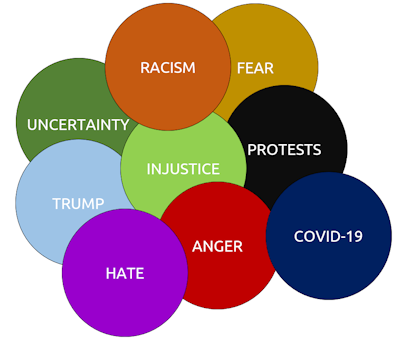The Mass Media's Role in Conflict
by
Almost everything we know about the events of the last five months have come from the media.
Even if we know someone who got or even died from COVID-19, almost everything we know about the disease—about how contagious it is, how dangerous it is, how one gets it, what one should do to avoid getting it—comes from the media. The answers to those questions vary greatly, depending on what media one consumes.
This is due, in part, to the newness of the disease and the fact that science and medicine still don't know all that much about it. Add to that the political spin that is being put on the information, and you end up with very contradictory images of the situation.
President Trump, and his supporters, continue to maintain that it is no big deal, that masks aren't necessary, testing isn't helpful, and large gatherings and business-as-usual is fine. These ideas are reinforced by Fox News, the conservative social media, and conservative newspapers. Liberals are much more—cautious they see the virus as a serious threat, they emphasize how many it has killed and disabled already, and caution people through all available media to take extensive precautions—masks, social distancing, testing, contact tracing, etc.
| Most of us believe "our" sources of information and discount the "other," unreliable information. |
So what is "true" and how do we know? Most of us believe "our" sources of information and discount the "other," unreliable information. In this case, infection rates and death rates might tell us which story is correct (if those were accurately reported, which, apparently, they are not). Until we get over ultra-partisan news, we'll probably never know what's really going on vis-a-vis COVID-19 and our response to it is, therefore, is going to be fairly (maybe very) ineffective.
| Our understanding about why George Floyd was killed, why the protests happened, what they mean, and what should be done about them diverge sharply, depending on what media sources one consumes. |
The same is true for our images of police, police brutality, and systemic racism in this country. Here we all do seem to agree on one thing—that a Black man named George Floyd was killed by a policeman in Minneapolis, Minnesota on May 25, 2020. Beyond that very simple fact, though, our understanding about why this happened, what it means, and what should be done about it diverge sharply, depending on what media sources one consumes.
Liberals blame the killing on systemic racism and a nationwide racist police system; President Trump and his supporters blame it on criminal Blacks and liberals. So, again, which is "true" and how do we know? As is true for COVID, most of us believe "our" sources of information and discount the "other," unreliable information—in this case going beyond saying the other side is "unreliable," to implying that they are outright racist (from the liberal view) or criminal (from Trump's view). We are not going to be able to successfully deal with this situation, either, until we can reach some basic agreement about what is going on.
| We need to change the way the media collects information, the way they report it, and the way the general public and decision makers consume it and respond to it. |
To do that, we need to change the way the media collects information, the way they report it, and the way the general public and decision makers consume it and respond to it. Right now serious flaws in all four of those areas are often giving us very inaccurate information about what's going on in the world. This then gravely hampers our ability to make good decisions about how to respond to events. For instance, should we go to that protest, should we wear a mask, should we vote for a city council that will "defund the police," should we demand our school get rid of the school resource officers (or should we perhaps increase them)? All these decisions depend on good information—and that is very hard to come by.
| For more on this topic, see the newly revised Conflict Fundamentals essay on Mass Media. |
For a much more detailed discussion about the way the media influences our knowledge and beliefs—and the way that is preventing us from solving our many social, economic, and environmental problems, see the newly updated Conflict Fundamentals essay on Mass Media.








